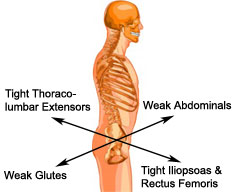Written by Michael on August 28, 2013 |

Is your golf swing hurting you?
One common phenomenon that can lead to these compensations is called Lower Crossed Syndrome. It was first established by a Czech physician named Vladimir Janda. He noticed that over time, people developed the same muscle imbalances that caused poor posture and movement mechanics.
Continue Reading »
Written by Michael on August 21, 2013 |
Swinging a golf club requires an immense amount of flexibility and strength. Our muscles must have the proper length and firing pattern to allow it to move in the correct planes at the precise time. Our spinal, hip, knee, ankle, shoulder, elbow, and wrist joints have to allow the proper amount of mobility and to obtain those ranges of motion in the golf swing. When one joint or muscle is tight or weak, the body naturally compensates, which puts extra stress on these overused joints or muscles. Overtime, this can result in degenerative or arthritic changes in the joints and/or muscle strains or tears. You can prevent these compensations from happening by simply getting a golf evaluation. Call us at ProActive if you have any questions about what an evaluation encompasses.
Written by Michael on August 14, 2013 |
The game of golf has grown from a niche sport to one that all ages, shapes, and sizes of people play all over the world. Here in Southern California, we have hundreds of golf courses for thousands of golfers and a lot of these golfers are playing in pain. I am a Titleist Performance Institute (TPI) Certified Professional and one of my goals is to get those golfers swinging pain-free and enjoying their time more out on the course. If you have an injury or pain when playing golf, don’t continue playing through the pain.
Continue Reading »
Written by Michael on August 8, 2013 |

As a physical therapist, one of the most important things that we can do for our patients is to educate them. Informing our patients on why they are in pain or are not able to run is an essential aspect of rehab. After determining the impairments and the cause of pain, your ProActive Physical Therapy and Sports Medicine PT will come up with ways to  Continue Reading »
Continue Reading »




